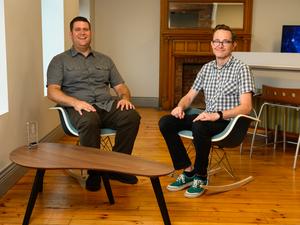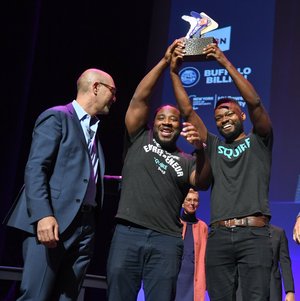Dave Salvant and Songe LaRon popped on stage at Shea’s Performing Arts Center in October 2017 to pitch their company to a panel of judges in the 43North business competition.
Squire Technologies ended up winning a $650,000 investment from the state-backed startup competition, giving up 5% of their company and pledging to run the business from Buffalo for a year. They moved the company here a few months later with big dreams and a handful of employees.
A lot has changed in just a few years for Squire, which provides software that helps barbers manage their business.
The company raised nearly $100 million in venture capital last year, itself a rarified feat, but more so because its founders are two Black men. If you go by Crunchbase data, Squire raised a whopping 10% of all U.S. venture capital that went to Black-owned startups in 2020. Squire was among nine companies listed under the headline “Is the first Black-owned tech unicorn finally in reach?” by digital publication People of Color in Tech in January.
The company is now backed not only by venture capital firms but investors such as basketball icon Steph Curry and musicians Quincy Jones and Pharrell Williams.
In other words, LaRon and Salvant have become symbols of the ingenuity of Black founders when they’re given support and resources. But with LaRon living in New York City and Salvant in Houston, and employees spread in clusters across America, the company has also become a major civic litmus test in Buffalo. Can the region remain a big part of Squire’s plans going forward?
Speaking to Business First recently, Salvant said there is no reason to doubt that.
About one-third of Squire’s 100-person workforce is in Buffalo, and the area is viewed as a long-term hub of talent for the company. Squire will continue to search for high-aptitude employees regardless of location, but New York City, Buffalo and perhaps Austin are viewed as places where Squire will have a visible presence and offices.
While Squire is at a point where it is targeting high-end talent throughout its organization, Salvant and LaRon also believe in employee clusters where human-to-human interaction breeds innovation and problem-solving.
“Buffalo is core to who we are at Squire,” Salvant said. “We have leadership in Buffalo, and we will continue to build out that infrastructure and talent pool in Buffalo.”
Squire maintains an office space at the 43North incubator in Seneca One Tower, though employees are still working remotely during the pandemic.
43North effect
Salvant and LaRon met in New York City and formed Squire in 2015. LaRon has a bachelor’s degree in philosophy from UCLA and a law degree from Yale University, and previously worked in corporate law and finance before becoming a full-time startup entrepreneur. Salvant graduated from the University of Albany in 2008 and worked in banking and sales before earning an MBA from University of Wisconsin-Madison in 2015.
Salvant lived in Buffalo for a year before moving on in 2019, and during that time he planted the seeds of what would become a successful team (key local employees include onboarding manager Kevin Cheney and director of data analytics director Kat Carter).
He said he would recommend the 43North program to anyone and that the company wants to follow in the footsteps of ACV Auctions, a Buffalo-based software company that won an earlier version of 43North and just went public in March on the NASDAQ stock exchange.
“We try to stay close to the 43North community and to continue following things like ACV,” Salvant said. “Buffalo has created boundless opportunities for Squire and for us personally. It’s a great community and we look forward to giving back to the community as time goes on.”
Besides 43North’s equity stake in the company, one of Buffalo’s most prominent business executives also recently invested in Squire. Rene Jones, chairman and CEO of M&T Bank, participated in Squire’s $59 million Series C funding round, which closed in December.
Role models
LaRon and Salvant also became members of the Endeavor Global network of entrepreneurs, having been onboarded through the Endeavor Western New York chapter.
“They represent something powerful about tapping into innovation across demographic groups, in providing those opportunities and identifying those big-thinking entrepreneurs who are minorities,” said John Gavigan, managing director of the Endeavor WNY office. “There are Black kids in every community who are going to look at what Songe and Dave are doing and say to themselves, ‘I want to be like them.' ”
Squire survived the bleak spring and early summer of 2020, and eventually surged to 200% year-over-year growth in revenue. The company expects to double its headcount this year alone as it builds new products – a digital banking product for barbers, for instance, will be released soon – and seeks to rapidly onboard new business clients onto a software platform that was built to help them grow.
LaRon and Salvant have worked tirelessly over the last five years to solve problems for their core customers, themselves an overlooked segment of the small business market. In between the Y Combinator accelerator program and 43North, they operated a barbershop for a year to get firsthand experience and spent as much time as possible talking directly to barbershop owners.
In the meantime, they went from an “Uber for barbershops” model into an end-to-end software solution.
“We are providing barbershop owners with more tools that allow them to live better lives and have more economic freedom,” Salvant said. “We are market leaders who have a product that is just superior to our competitors.”
Squire remains very much in the midst of its maturation process, with a broad business development strategy that targets customers anywhere in its footprint. It plans to expand throughout the English-speaking world, and then perhaps beyond.
As that happens, the team in Buffalo is expected to continue growing along with the rest of the company, though how big it gets is hard to to say right now, Salvant said. The pandemic has limited their on-the-ground presence here, but both LaRon and Salvant expect to make regular trips again when it is safe and feasible.
"We're going to continue growing that Buffalo team and we'll be there more and more as the pandemic subsides," he said.
In the meantime, Salvant said he and his business partner are keenly aware of the symbolism of their success. For now, it is mostly about leading by example, but they are young men, and their profile will likely only rise.
He hopes that other entrepreneurs of color are inspired by Squire, and investors “pattern match” against its profile.
“We understand the magnitude of our success and how it reverberates in communities,” he said. “The more successful we are, the more opportunities for others to follow in our footsteps.”








